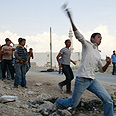
Judge: State discriminating between Jews, Arabs
Nazareth Juvenile Court acquits teen accused of attempting to sabotage police car during Operation Cast Lead, criticizing State's 'systematic selective enforcement'
The 17-year-old Nazareth resident was accused of hurling stones at a police car on the road leading to the central Galilee town of Tzippori, several days after the Israeli operation in Gaza was launched.
The state demanded that he serve time in prison, claiming that this would help deter Arab citizens from committing similar acts, but the judge ruled that this "fundamentally contradicts the principles of justice and legal decency."
The State Prosecutor's Office representatives said that the request to convict the youth stemmed from a public interest of deterring Arabs, but the teen's defense counsel said that the State was discriminating between Arab and Jewish youth.
"In recent years, the State has been engaging in a policy of selective enforcement, which essentially means discrimination in the criminal enforcement policy… in 'ideological' offenses involving attacks on members of the security forces," the lawyer said.
Judge Yuval Shadmi instructed the youth to commit himself in writing to a payment of NIS 5,000 (about $1,334), ruling that he must refrain from violence and offenses against the police for two years. The teen was also ordered to perform 200 hours of community service and he will not be able to receive or possess a driver's license for two years.
'Didn't want to lie to myself'
The judge wrote in his verdict: "The State's argument that each case should be judge individually in and of itself – ignoring the big picture that the defense attorney drew – captured my heart for a moment and at first I was leaning towards adopting it, but the more I thought about it, I came to the conclusion that if I do act in this manner, I will be lying to myself."
He said that if he had accepted the State's position, he would have had to sentence the defendant to many months of incarceration – a move that was meant to deter him and others from repeating similar acts.
"In more colorful words I will say that the State is not authorized to caress with one hand the Jewish 'Ideological' felons, and flog with its other hand the Arab 'ideological' felons. If the State feels that ideological offences justify relatively forgiving enforcement for minors, then this should be the policy towards all minors regardless of nationality or religion," he ruled.
The judge signed the verdict saying he was disturbed with the idea that a verdict could "affect the effectiveness of the criminal court and encourage minors to go back and repeat similar offences," but was also concerned with the motion that a verdict may be turned into another link in the chain of "the State's systematic selective enforcement."
The Adalah Legal Center for Arab Minority Rights in Israel said the verdict supports their claims. "We repeat that there is no doubt that the law enforcement system and the pardoning in this state are infected with deep-rooted discrimination against the Arab citizens."
Sharon Roffe-Ofir contributed to this report










